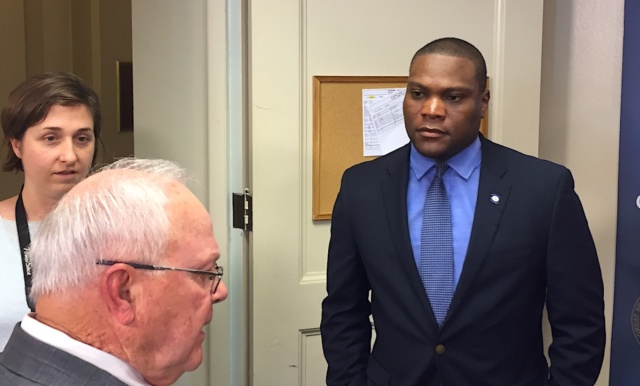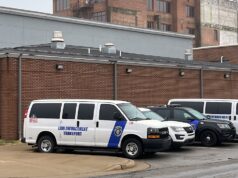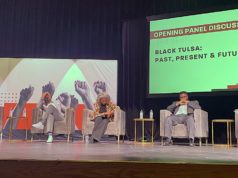

Hours after a jury delivered Tulsa Police Officer Betty Shelby a not-guilty verdict on a manslaughter charge, Rep. Monroe Nichols stood outside a Tulsa Regional Chamber luncheon at the Oklahoma State Capitol and pondered his identities: black man, father, lawmaker.
“When something like this happens, you feel incredibly powerless. You feel incredibly frustrated. You feel angry,” said Nichols (D-Tulsa). “It makes it hard to formulate words to tell people. We all want people to be peaceful and all that, but it’s hard to formulate words on all of this.”
Shelby was acquitted Wednesday night in the shooting death of Terence Crutcher, a black man from north Tulsa who was unarmed, intoxicated and unresponsive to Shelby’s commands as he walked around his vehicle, which was stopped in the middle of a street in September 2016.
“Because this issue becomes political, far too often we forget that there was a man who is not here anymore, and the crime that he committed was that his car stopped,” Nichols said Thursday. “This should come as a realization to the law enforcement community at the very least that there has to be substantial changes to the way officers are trained.”
Nichols argued that, had Shelby acted as a regular citizen and not a trained police officer, she would almost certainly have been convicted.
“I know Officer Betty Shelby continued to say, ‘My training, my training, my training.’ Well, if this is where training leads us, we really need to be looking hard at what we need to do differently as it relates to training,” Nichols said.
‘Make sure a regular traffic stop is not a death sentence’
Others at the Tulsa Chamber’s luncheon felt similarly.
“I think Rep. Nichols is 100 percent on target. I think there needs to be additional training,” said Rep. Eric Proctor (D-Tulsa). “It’s clear there is an issue in our community and across the country that this continues to happen. We need to support our police officers, but we also need to make sure a regular traffic stop is not a death sentence. I think additional training would be a positive thing.”
An hour earlier, Proctor had led the House chamber in prayer for his hometown. He called for wisdom, discernment and the “protection of all our citizens, including law enforcement.”
That request was echoed by Tulsa Fraternal Order of Police chairman Jerad Lindsey, who joined Proctor, Nichols and dozens of others in the governor’s blue conference room for the luncheon.
“Of course, we’re pleased that our member was cleared and received an acquittal, however this deal is not about wins and losses,” Lindsey said. “There are no winners in this. The Crutcher family has lost a family member that they cannot replace.”
Lindsey said he “absolutely” agrees with Nichols that police training can and should improve, though he specified he was only hearing the representative’s remarks secondhand.
“We agree with most of that. We also believe training has got to adapt. It’s got to adapt and move with society,” Lindsey said. “Another thing we need to look at is how citizens are trained to interact with the police. The police have to adapt to the citizenry, (…) but I’m an Oklahoman. When I went through school, I went through driver’s ed, and driver’s ed was provided by the school district. It’s no longer done like that because of budget cuts.”
Lindsey said young people today receive less education on law enforcement and the legal system than they used to.
“So we’ve got a generation now that didn’t go through state-sponsored driver’s ed. In mine, I believe it was part of the curriculum, we had a state trooper that came in and talked about car stops,” Lindsey said. “Those used to be things that were taught by the state of Oklahoma to their citizens. We don’t have that anymore. I come across a lot of young folks who are 16 or 17 years old who don’t know how to act on a car stop. They don’t know what to do.”
But in the case of Terence Crutcher, only one side of the interaction was armed: the police.
“What is clear is that the training they receive is woefully inadequate when we have example after example after example of individuals who are killed only to find out they had no weapon on them and they weren’t a real threat,” Nichols said. “And, because of training, nobody is held accountable for that.”
With a 9-year-old son and an uncle who serves as a police officer in Dallas, Nichols said he in no way believes police officers are “inherently bad.” His father was also a police officer in Houston.
But Nichols said Shelby’s apparent training resulted in a family losing a loved one.
“Until we address that issue, my concern is not necessarily with protests and things like that. My greater concern is with people who look like me who are going to get pulled over by police but decide they are going to keep going because they are fearful,” Nichols said. “My concern is with people who look like me who aren’t going to call the police anymore because they are too afraid of what will happen when the police show up.”
‘This is not a big enough issue for the people in this building’
To look at all of these issues, Nichols had filed HB 1353 at the start of the 2017 legislative session. The bill would have created the Oklahoma Community Policing Standards Task Force to examine policies, standards, best practices and training on the use of deadly force.
“The governor said she didn’t want any more task forces. It wasn’t heard in committee. It didn’t pass,” Nichols said. “The fact is that this is not a big enough issue for people in this building right now. It should be, but it’s not. So if it’s not a big enough issue for people here, why should anybody else care? We had the opportunity to put something together and bring law enforcement and the community and legislators together and do something.”
Nichols said task forces exist for industry issues, and the state just created a new one to look at opioid abuse. But Nichols’ attempt to look at police training as it regards the use of deadly force appeared to be a non-starter with state leaders.
“That’s just as sad as what happened in Tulsa several months ago and what happened last night,” Nichols said. “It puts members of the law enforcement community in a bad spot also.”




















